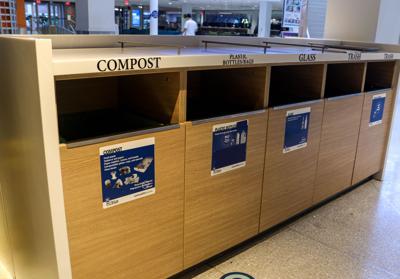Editor’s Note: Some of the names in this story have been changed to protect the identities of the individuals involved. The Daily Collegian has verified through fact checking these individuals exist.
Penn State has implemented a recycling process across campus, which includes an organized division of recycle bins that aim to help with environmental sustainability.
Everywhere around campus, students and faculty members can see the waste stations with different recycle bins designed by Penn State Sustainability.
Each waste station has six different waste stream bins, intentionally organized by food waste only (compost), trash (landfill), mixed paper and newspaper, metal (aluminum cans), glass and plastic bottles.
Ayodeji Oluwalana, waste reduction and recycling program manager, said the bins are emptied daily and taken to each building’s loading dock, where a crew comes to pick them up.
Each recycling bin is then transported to the Centre County Recycling and Refuse Authority, where they are processed, compacted and sold to companies that will use them as raw materials for new products.
On occasion, Oluwalana said recyclables are thrown into the wrong bin and need to be sent to the landfill with the regular trash.
Every recycling bin is collected and separated independently in the source-separation process.
The process doesn’t allow mixing of different recycling bins, since this contaminates the landfill and cannot be recycled.
“I will say that our recycling streams are fairly OK, but we are still experiencing an average weekly contamination rate of about 40%,” Oluwalana said. “This is not acceptable, and we are working on continuously educating students about the importance of this process.”
According to Oluwalana, the majority of the contamination is coming from the residence halls and dining locations across campus.
One of the main issues concerning the contamination in dining hall areas is food waste since it’s part of the recycling and composting process on campus.
In partnership with Student Affairs and Sustainability, the dining halls limit food waste by using a menu management system called FoodPro to accurately predict the amount of students and food portions served during any meal period.
This, combined with batch cooking during the meal period, allows them to limit food waste and leftovers.
“Some leftover food can be reutilized into additional meal periods,” Jim Meinecke, the director of residential dining, said. “We try to recover food and deliver these meals to various local organizations supporting those in need.”
In order to track compost, the staff also uses Leanpath as a food waste management tracking system.
“This allows us to track compost, both pre-consumer and post-consumer,” Meinecke said. “Pre-consumer information allows us to follow up with kitchen staff to better understand why something was composted. It also allows us to better educate on how to limit food waste.”
This information is shown to students by educational signs and shared on the Penn State Sustainability webpage.
Sammy, a student who wished to remain anonymous, said in order to inform students about the process, the university “need(s) to show them how important it is.”
As a former resident assistant and alumna, Sammy said “most students don’t notice the recycling bins.”
“Some may think it’s not even worth it to separate the trash,” Sammy said. “But with this process, we are actually contributing with something that can help not only us, but the whole planet in the long run.”
MORE CAMPUS COVERAGE
Penn State students gathered on Monday to give back to the State College community in rememb…




